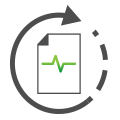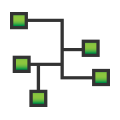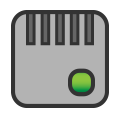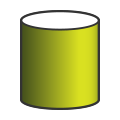
Vehicle Spy Application |
- Vehicle Spy allows simultaneous monitoring and transmission on multiple vehicle networks. These networks can have different vehicle network protocols.
- Custom tabs allow for quick maneuvering between screens
- Save and recall Vehicle Spy setup files
- Vehicle Spy Logon manages multiple users, keeps track of your last 100 setup files, and manages the data directories
- C Code Interface for coding more complicated functions
- Access to GPS (Global Positioning System)
- Message discovery function with message monitor allows a user to reverse engineer message strategies
- Online help with step-by-step tutorials
|

Messages View |
- Displays message text descriptions
- Displays all signals contained in a message such as RPM, Pedal Position, Vehicle Speed, etc.
- Include and exclude filters based on Network, Node, Message, and Data Type
- Displays all networks in the same monitor
- Pause and review history
- Absolute and relative time display
- Storage and Review of Data Files in an Excel compatible format which includes message descriptions and signals
- Post acquisition filtering and analysis
- Hexadecimal, Decimal, Binary and ASCII data displays
- Color Filters based on Message, Network, or Node
- Buffer History is limited only by system memory - allows history lengths of greater than a million messages
- Custom fonts and colors
- Bus load display
- Display formats include hex, decimal, ASCII, and binary
- Activity Coloring: Messages and Signals that are not present are grayed out. Messages and Signals that are received toggle from black to dark red every time they are
received.
- Data byte change highlighting. Every time a message byte changes it is highlighted blue. This allows detection of message changing status.
- Sort the monitor based on any message part
- Copy Messages to Message Editor quickly through right-click menu
|

Message Editor |
- Received Messages and Transmit Messages organized into separate tables
- Online interactive editing (you don't have to stop Vehicle Spy or go "offline"!)
- Specify Message with byte, nibble or bit resolution for entire message
- Select Database button to quickly load a message or signal from the database
- Calculate a binary, state encoded, text, and analog signal from a message with an arbitrary equation.
- Custom binary and analog formats including binary, hex, engineering, and scientific notation.
- Link to a Transmit Message on any network allows auto response or transmit on change functionality
- Calculated signal type allows a sinusoidal, ramping and custom equation signal generation
- Expected Length input verifies a message's length
- Specify based on message properties such as errors or bus events
- Selectable color specification per message
- Cut, copy, paste and sort messages and signals
|

Transmit Panel |
- Transmit Messages defined in Message Editor View are automatically listed in the Transmit Panel
- Transmitted Message data can be calculated from messages and signals, received or otherwise
- Periodic message transmission
- Manual transmit button included as part of the pane,
|

Graphical Panels |
- Build your own custom application with panels that have controls and indicators
- Controls and indicators include the following: Chart, Transmit Button, Function Block Button, On/Off Button, Knob, Meter, LED/Light, Text Display, Text Entry, Numeric Entry,
Graphical Display, Dropdown List, Barograph, Grid, Action Button, and Scrolling Monitor
- Charts X vs Y and Y vs T
- Dropdown control for State Encoded parameters such as PRNDL or Power Mode
- Action Button allows printing of panel, switching panels, and access to the user's data directory
- Graphical display allows colored lines and custom graphics, such as logos, on the panel
- Each user interface item has many properties allowing customization
- Visual Studio style property editor
|

Networks
|
- Supports any number of networks
- Selectable color specification per network
- Network Stats for CAN and J1850 networks including: message count, message rate, message rate max, bus utilization, and bus utilization max.
|

Nodes
|
- Supports any number of Nodes
- Nodes can come from different networks
- Selectable color specification per node
- Nodes Stats for CAN and J1850 networks including: message count, message rate, message rate max, bus utilization, and bus utilization max.
|

Function Blocks |
- Replay of captured network traffic back with optional filter
- Custom script which has script commands: Jump to step, Transmit Message, Wait a specific amount of time, wait for a specific equation to be true, (trigger, start, stop, save)
another function block, set an incoming message to value or equation, reset a messages stats, stop script, show a graphical panel, jump to a step if an equation is true, and
more.
- Capture a network buffer with pre-post triggering based on an arbitrary equation
- Automatically save network traffic with unique file naming
- Actuate a digital output based on an event
- Transmit a group of messages with a programmable inter-message delay and offset
- Start, stop, and trigger the Function Block based on equations or other function blocks
- Create as many function blocks as you require
|

Databases |
- Load external database that can define the messages received and transmitted on the vehicle network
- Databases allow automatic description and display of messages and signals
- Allows quick entry into the Message Editor
- DBC and UEF file formats for import and export support
- Each network can have a separate database
|

Diagnostics |
- Builds and Launches diagnostic requests
- Uses database to decode diagnostic responses
- Data returned in easy to understand text and raw message format
|

VehicleScape DAQ |
- Collects and logs different types of message data: Normal Messages, GMLAN, ISO14229, CCP, XCP, or custom defined signals
- Configure PC logging to store collected information to the PC
- Build a standalone logging script through a few simple setup dialogs
- Set up multiple collections with different trigger conditions
- Gateway signal data to new frames for other devices
- Configure standalone setups for Wireless neoVI
|